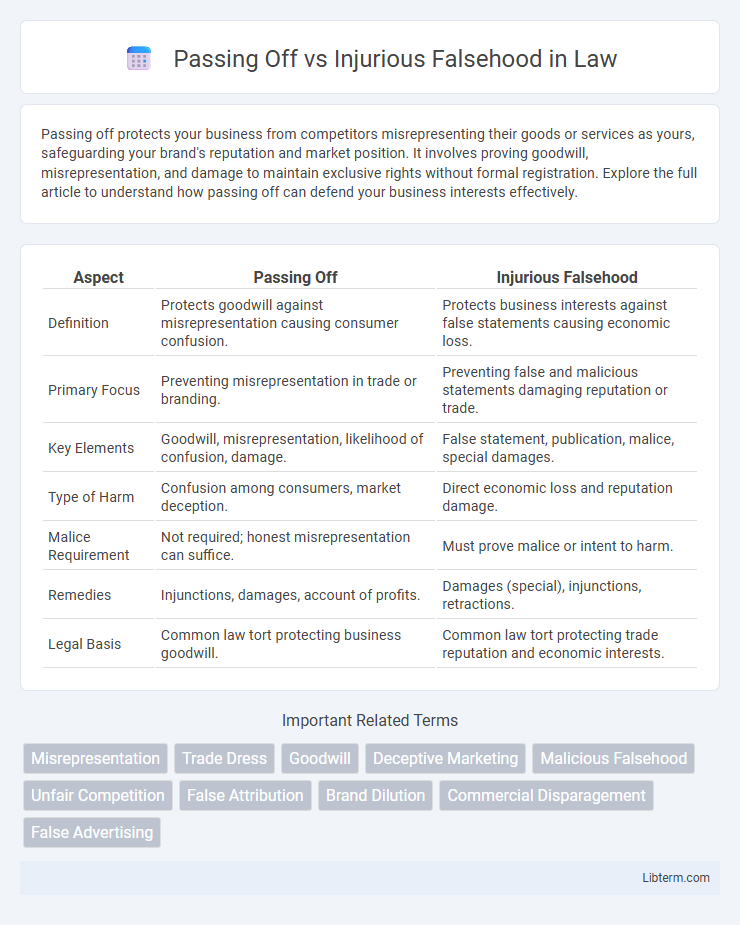Passing off protects your business from competitors misrepresenting their goods or services as yours, safeguarding your brand's reputation and market position. It involves proving goodwill, misrepresentation, and damage to maintain exclusive rights without formal registration. Explore the full article to understand how passing off can defend your business interests effectively.
Table of Comparison
| Aspect | Passing Off | Injurious Falsehood |
|---|---|---|
| Definition | Protects goodwill against misrepresentation causing consumer confusion. | Protects business interests against false statements causing economic loss. |
| Primary Focus | Preventing misrepresentation in trade or branding. | Preventing false and malicious statements damaging reputation or trade. |
| Key Elements | Goodwill, misrepresentation, likelihood of confusion, damage. | False statement, publication, malice, special damages. |
| Type of Harm | Confusion among consumers, market deception. | Direct economic loss and reputation damage. |
| Malice Requirement | Not required; honest misrepresentation can suffice. | Must prove malice or intent to harm. |
| Remedies | Injunctions, damages, account of profits. | Damages (special), injunctions, retractions. |
| Legal Basis | Common law tort protecting business goodwill. | Common law tort protecting trade reputation and economic interests. |
Introduction to Passing Off and Injurious Falsehood
Passing off protects a business's goodwill by preventing others from misrepresenting their goods or services as those of the original owner, thereby avoiding consumer confusion. Injurious falsehood involves making false statements that damage a competitor's goods or business reputation, resulting in economic harm. Both torts serve to safeguard commercial interests but differ in their legal elements and scope of protection.
Defining Passing Off
Passing off is a common law tort protecting the goodwill of a trader from misrepresentation that causes consumer confusion and damages the business. It occurs when one party misleads the public into believing their goods or services originate from another, thereby exploiting the established reputation. Unlike injurious falsehood, passing off centers on preventing deception linked to brand identity and commercial goodwill.
Understanding Injurious Falsehood
Injurious falsehood involves the publication of false statements that intentionally cause financial harm to a business, distinct from passing off which protects goodwill associated with trademarks or trade dress. The key elements include malice, falsity of the statement, and demonstrable damage to economic interests. Businesses affected by injurious falsehood can seek damages for lost profits and reputational harm under tort law.
Key Legal Elements of Passing Off
Key legal elements of passing off include establishing goodwill or reputation attached to the plaintiff's goods or services, proving a misrepresentation by the defendant leading to deception or confusion among the public, and demonstrating actual or potential damage to the plaintiff's business or goodwill. The misrepresentation must be substantial enough to cause consumers to mistake the defendant's products or services for those of the plaintiff. Courts require clear evidence of these elements to protect unregistered trademarks and prevent unfair competition in commerce.
Key Legal Elements of Injurious Falsehood
Injurious falsehood requires proof of a false statement of fact made maliciously or with reckless disregard for its truth, targeted at the plaintiff's goods or business to cause economic loss. Unlike passing off, which centers on misrepresentation causing confusion of origin, injurious falsehood focuses on malice and demonstrable special damages. The claimant must establish that the false statement directly resulted in quantifiable financial harm to succeed in a claim of injurious falsehood.
Differences Between Passing Off and Injurious Falsehood
Passing off protects the goodwill and reputation of a business by preventing misrepresentation that causes consumer confusion, while injurious falsehood targets false statements that maliciously damage another's economic interests regardless of consumer confusion. The key difference lies in the requirement of goodwill for passing off claims, whereas injurious falsehood focuses on the publication of false, damaging statements even without an established reputation. Passing off primarily safeguards brand identity and customer trust, whereas injurious falsehood addresses the broader harm caused by defamatory trade disparagement.
Common Examples in Business and Commerce
Passing off commonly arises when a business misrepresents goods or services as those of a competitor, such as selling counterfeit luxury handbags or mimicking a rival's packaging design. Injurious falsehood involves deliberate false statements damaging a competitor's product reputation, like falsely claiming a rival's food product contains harmful ingredients. Both torts protect commercial interests but passing off focuses on brand identity misappropriation, while injurious falsehood targets harmful trade disparagement.
Legal Remedies and Defenses
Legal remedies for passing off primarily include injunctions to prevent further misrepresentation, damages for losses caused by the unauthorized use of goodwill, and accounts of profits derived from the infringement. In contrast, injurious falsehood remedies focus on compensatory damages for economic harm resulting from false statements that disparage a competitor's goods or business. Defenses against passing off typically involve proving the absence of goodwill or misrepresentation, while injurious falsehood defenses often require demonstrating the truth of the statements or the absence of malice in their publication.
Landmark Cases and Jurisprudence
The landmark case of *Reckitt & Colman Products Ltd v Borden Inc* established crucial principles in passing off by requiring proof of goodwill, misrepresentation, and damage to reputation. In *Gourmet International Products Ltd v BBC*, the Court emphasized the need for clear evidence of economic loss in injurious falsehood claims, distinguishing it from passing off. Jurisprudence continues to refine these torts, with courts closely analyzing intent and the nature of false statements to balance protection of trade reputation against free competition.
Practical Tips to Avoid Legal Liability
To avoid legal liability in Passing Off and Injurious Falsehood cases, businesses should ensure their branding clearly differentiates from competitors and avoid false statements about rival products. Maintain accurate and verifiable marketing communications to prevent claims of misleading representation or disparagement. Implement thorough trademark searches and document evidence of genuine goodwill to strengthen defenses against unfair competition actions.
Passing Off Infographic

 libterm.com
libterm.com